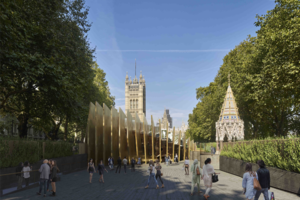Related Research Articles

Planning permission in the United Kingdom is the planning permission required in the United Kingdom in order to be allowed to build on land, or change the use of land or buildings. Within the UK the occupier of any land or building will need title to that land or building, but will also need "planning title" or planning permission. Planning title was granted for all pre-existing uses and buildings by the Town and Country Planning Act 1947, which came into effect on 1 July 1948. Since that date any new "development" has required planning permission. "Development" as defined by law consists of any building, engineering or mining operation, or the making of a material change of use in any land or building. Certain types of operation such as routine maintenance of an existing building are specifically excluded from the definition of development. Specified categories of minor or insignificant development are granted an automatic planning permission by law, and therefore do not require any application for planning permission. These categories are referred to as permitted development.
Town and country planning in the United Kingdom is the part of English land law which concerns land use planning. Its goal is to ensure sustainable economic development and a better environment. Each country of the United Kingdom has its own planning system that is responsible for town and country planning, which outside of England is devolved to the Northern Ireland Assembly, the Scottish Parliament and the Senedd.

The Town and Country Planning Act 1990 is an act of the United Kingdom Parliament regulating the development of land in England and Wales. It is a central part of English land law in that it concerns town and country planning in the United Kingdom. Repealed in parts by the Planning and Compensation Act 1991, it is now also complemented by the Planning and Compulsory Purchase Act 2004.
Building regulations in the United Kingdom are statutory instruments or statutory regulations that seek to ensure that the policies set out in the relevant legislation are carried out. Building regulations approval is required for most building work in the UK. Building regulations that apply across England and Wales are set out in the Building Act 1984 while those that apply across Scotland are set out in the Building (Scotland) Act 2003. The Act in England and Wales permits detailed regulations to be made by the Secretary of State. The regulations made under the Act have been periodically updated, rewritten or consolidated, with the latest and current version being the Building Regulations 2010. The UK Government is responsible for the relevant legislation and administration in England, the Welsh Government is the responsible body in Wales, the Scottish Government is responsible for the issue in Scotland, and the Northern Ireland Executive has responsibility within its jurisdiction. There are very similar Building Regulations in the Republic of Ireland.
Development Management, formerly known as planning control, or development control, is the element of the United Kingdom's system of town and country planning through which local government or the Secretary of State, regulates land use and new building, i.e. development. It relies on a "plan-led system" whereby development plans are produced, involving various stages of public consultation prior to being adopted. Subsequently, development that requires planning permission, which is granted or refused with reference to the development plan as the starting point, then other material considerations are taken into account. The term "development management" is often abbreviated to DM.

Curzon Gate was a residential development located on the edge of Birmingham City Centre, England, on a prominent gateway site into the city centre. The land was formerly occupied by Castle Cement silos. The 4-acre (1.6 ha) site was located in the Eastside area, which is currently witnessing a large-scale regeneration scheme. It was located next to Curzon Park and opposite Eastside Locks, both of which are developments. It was bounded by a railway viaduct to the south and a road junction on the A4540 road. It was separated from Curzon Park by the Digbeth Branch Canal.
Heart of the City II is a mixed-use development under construction in Sheffield city centre, England between the Devonshire Quarter and The Moor Gateway. The project was previously given the marketing name Sevenstone, prior to Hammerson, the developer, being dropped from the project in July 2013 with Sheffield City Council seeking new developers.

Medlar-with-Wesham is a civil parish and an electoral ward on the Fylde in Lancashire, England, which contains the town of Wesham. It lies within the Borough of Fylde, and had a population of 3,245 in 1,294 households recorded in the 2001 census. rising to 3,584 at the 2011 Census.

Snowhill is a mixed-use development in the Colmore business district, known historically as Snow Hill, in Central Birmingham, England. The area, between Snow Hill Queensway and Birmingham Snow Hill station, is being redeveloped by the Ballymore Group. The £500 million phased scheme has been partly completed on the site of a former surface car park adjacent to the railway station and West Midlands Metro terminus.

A loft conversion or an attic conversion is the process of transforming an empty attic space or loft into a functional room, typically used as a bedroom, office space, a gym, or storage space. Loft conversions are one of the most popular forms of home improvement in the United Kingdom as a result of their numerous perceived benefits. The installation of a loft conversion is a complicated process, and whilst it may be possible to attempt a 'DIY' loft conversion, the large amount of work involved often results in many people choosing to contract a specialist loft conversion company to undertake the task.

A site plan or a plot plan is a type of drawing used by architects, landscape architects, urban planners, and engineers which shows existing and proposed conditions for a given area, typically a parcel of land which is to be modified. Sites plan typically show buildings, roads, sidewalks and paths/trails, parking, drainage facilities, sanitary sewer lines, water lines, lighting, and landscaping and garden elements.

Nationally significant infrastructure projects (NSIP) are major infrastructure developments in England and Wales that bypass normal local planning requirements. These include proposals for power plants, large renewable energy projects, new airports and airport extensions, and major road projects. The NSIP nomenclature began to be used in 2008, and since April 2012 these projects have been managed by the Planning Inspectorate.
Triton Knoll Wind Farm is an 857 MW round 2 offshore wind farm nearing completion 33 kilometres (21 mi) off the coast of Lincolnshire, in the North Sea, England.

Brent Cross Cricklewood is a new town centre development under construction in Hendon and Cricklewood, London, United Kingdom. The development is planned to cost around £4.5 billion to construct and will include 6,700 homes, workspace for 25,000 people, four parks, transport improvements and a 592,000 sq ft (55,000 m2) extension of Brent Cross Shopping Centre. The developers of the scheme are Hammerson and Standard Life.

The Fishguard & Goodwick Marina is a planned development within the harbour of the Welsh towns of Fishguard and Goodwick in Pembrokeshire, south-west Wales. In April 2012 Pembrokeshire County Council revealed that they had given outline planning permission for the development of a marina to be located in the small town of Goodwick within Fishguard Harbour. The initial planning application was submitted to Pembrokeshire County Council in October 2011 by Conygar who wish to invest £100 million into the project.

The London Resort is a proposed theme park and resort in Swanscombe, Kent. The project was first announced on 8 October 2012; however, it has been subject to numerous delays since then, and the examination of its application for planning permission has been subject to considerable delay. Eventually, a decision will be made by the Secretary of State.

The Town Planning Board is a statutory body of the Hong Kong Government tasked with developing urban plans with an aim to ensuring the "health, safety, convenience and general welfare of the community through the process of guiding and controlling the development and use of land, and to bring about a better organised, efficient and desirable place to live and work." It is founded upon section 2 of the Town Planning Ordinance.

Kingswood, occasionally referred to as Kingswood Parks, is a modern housing estate on the northern fringe of Kingston upon Hull, England.

Planning permission or developmental approval refers to the approval needed for construction or expansion, and sometimes for demolition, in some jurisdictions. It is usually given in the form of a building permit.

A UK Holocaust Memorial memorial and learning centre was first proposed in 2015 to preserve the testimony of British Holocaust survivors and concentration camp liberators and to honour Jewish and other victims of Nazi persecution, including Roma, homosexual, and disabled people.
References
- 1 2 Barrett, Chris. "Consent types". www.planningportal.co.uk. Planning Portal. Retrieved 11 May 2020.
- 1 2 "Application Type Guidance" (PDF). www.planningportal.co.uk/. Planning Portal. Retrieved 11 May 2020.
- ↑ "The difference between Outline and Full Planning applications". J & J Design. J&J Design.